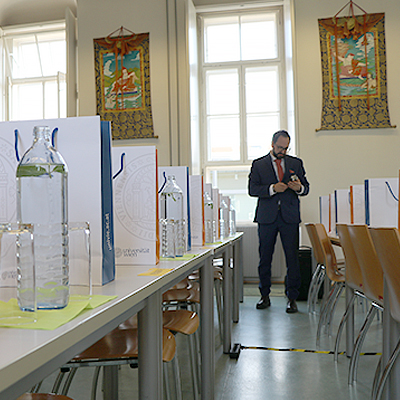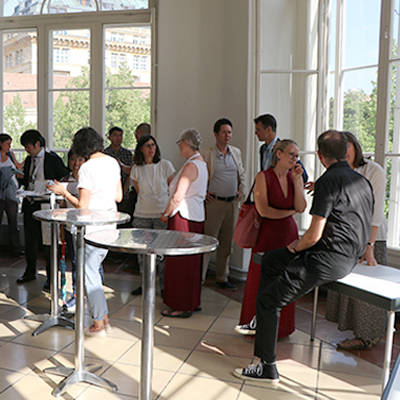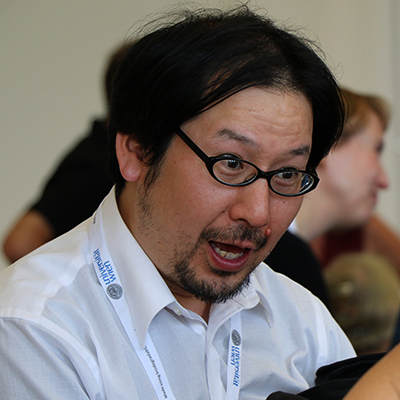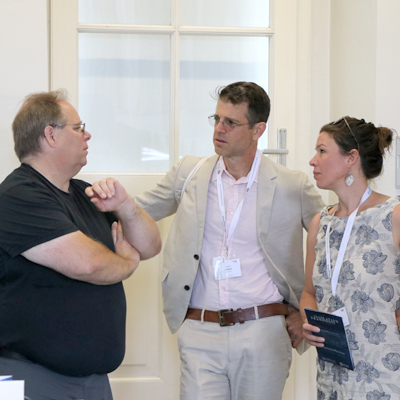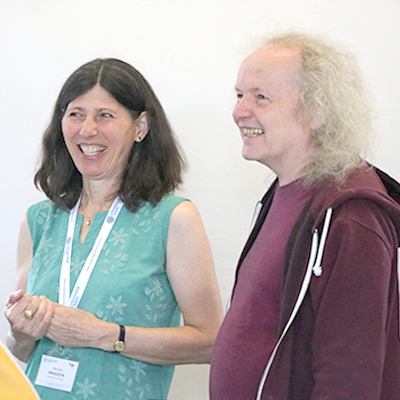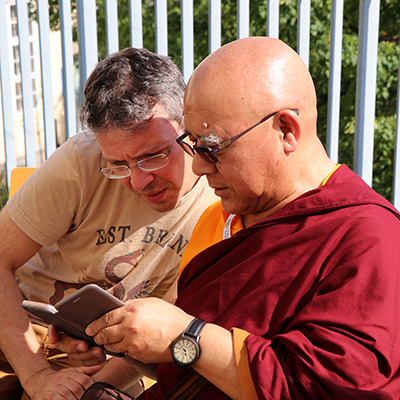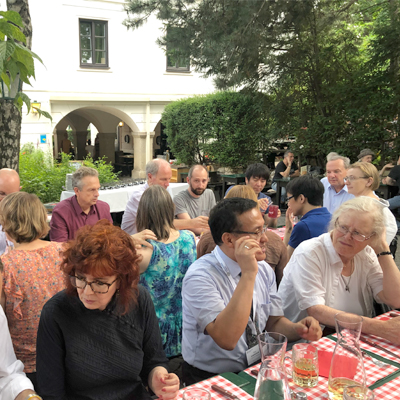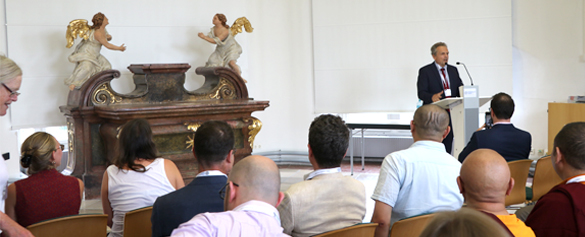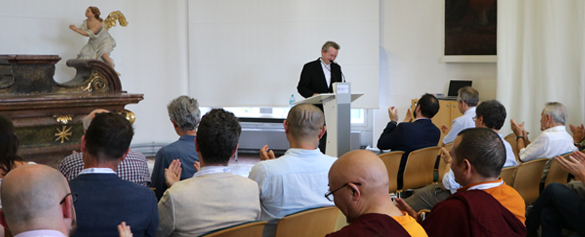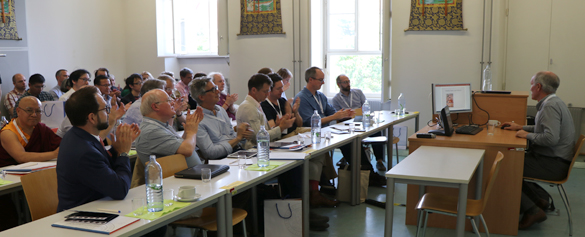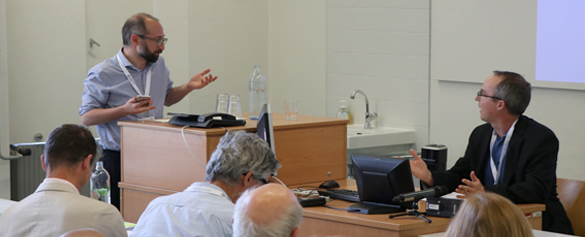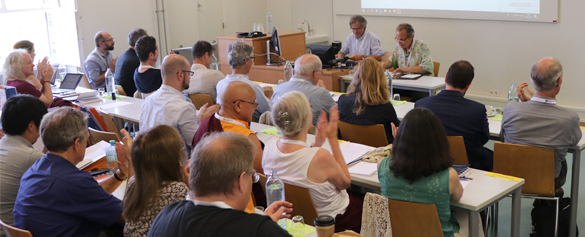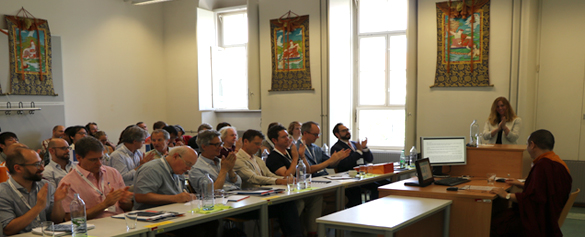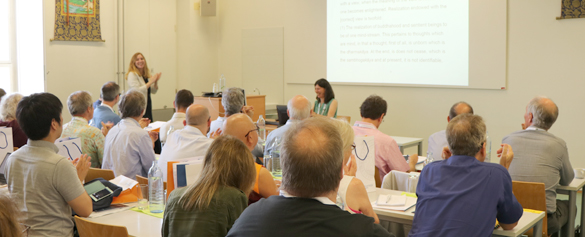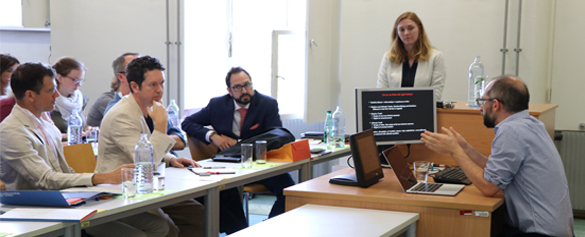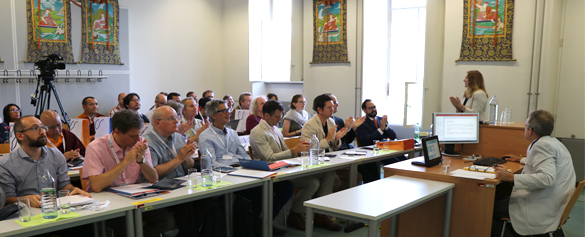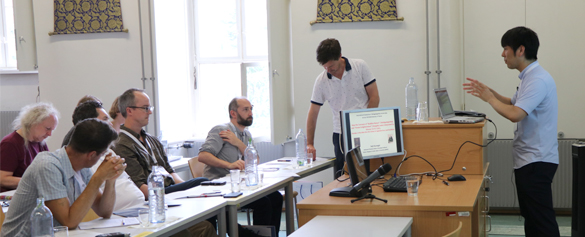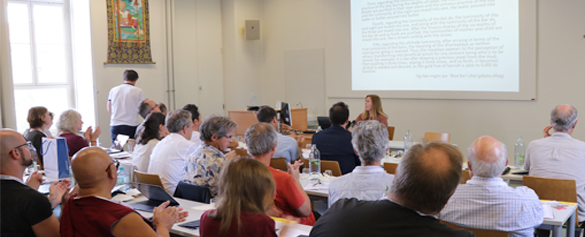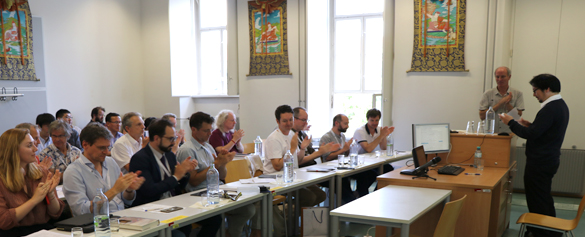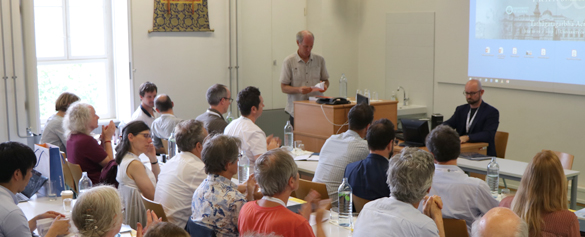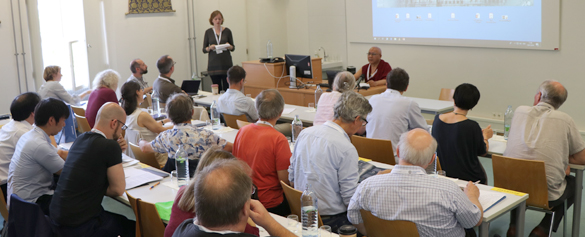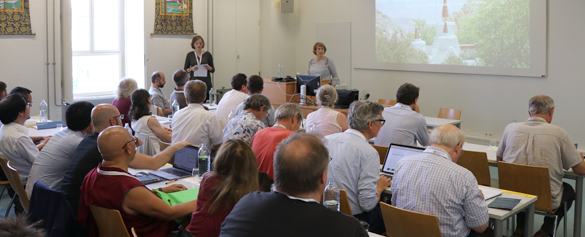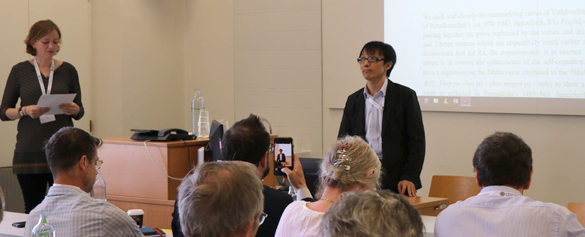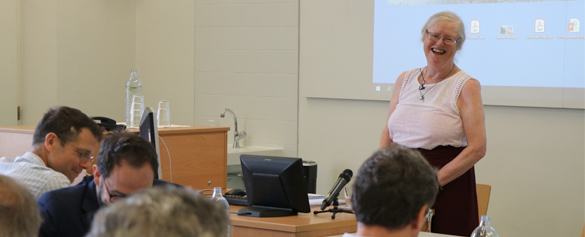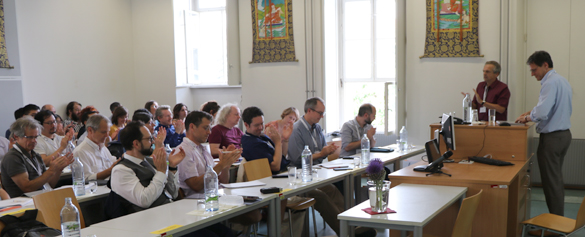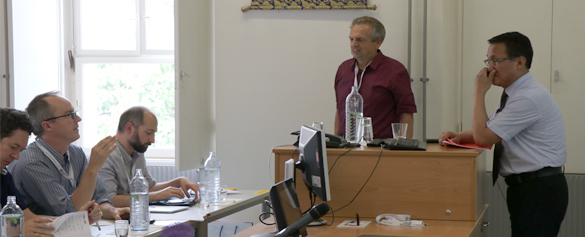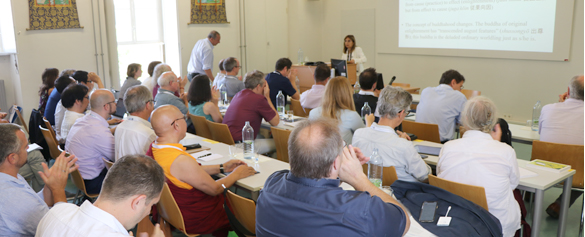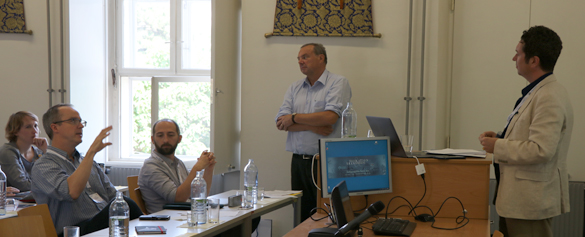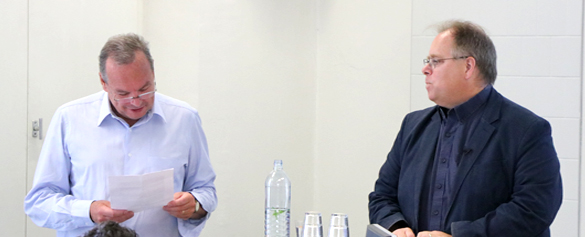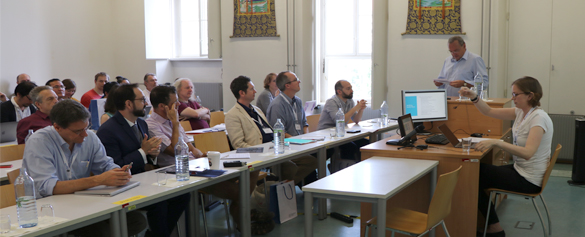New Update: Audio recordings only available here
Increased attention to the tathāgatagarbha doctrine in the last decade has lead to significant publications and meetings on the topic of buddha-nature and related themes. Scholars in Asia, Europe, and the Americas have published new translations and studies of the foundational scriptures and commentaries, and are examining the history and literature of the doctrine. In July 2019 Tsadra Foundation partnered with the University of Vienna to bring many of these scholars together for an international symposium titled Tathāgatagarbha Across Asia. The tathāgatagarbha doctrine, which proposes that all sentient beings are already a “buddha within” or at least have the potential to attain Buddhahood, was at first largely ignored in Indian scholastic Buddhism, but increasingly attracted the attention of Mahāyāna scholars and became an important, if sometimes controversial, current of Buddhist thought all over Central and East Asia. With the Mahāyāna goal of establishing all sentient beings in Buddhahood, the possibility of enlightenment became a Buddhist axiom of central importance. Either one has to explain the causal process of its production, or accept its primordial existence, for example in terms of a buddha-nature (tathāgatagarbha). The latter also applies, of course, when buddhahood is not taken to be produced from scratch. The way the process of becoming a Buddha is addressed is an ideal touchstone for systematically comparing the philosophical hermeneutical positions of various masters in Central and East Asia.

Over three days the symposium surveyed the differing forms of tathāgatagarbha doctrine that developed as its primary Indian scriptural sources were translated, transmitted, and interpreted by religious schools across Asia. Contemporary Buddhist teachers joined academics at the podium. Presentations ranged from the historical-philological analysis of the primary sources to issues of reconstruction and comparison in the target languages and cultures and included how tathāgatagarbha is taught in Buddhist communities today. Although primarily focused on the Indian and Himalayan material, the diversity in approaches and subject matter made for fruitful comparisons and discussions. All presentations were recorded, and the videos and downloadable audio files are available below. Organizers are planning on publishing the proceedings of the symposium in book form, and for this reason transcripts of the talks are not being released.

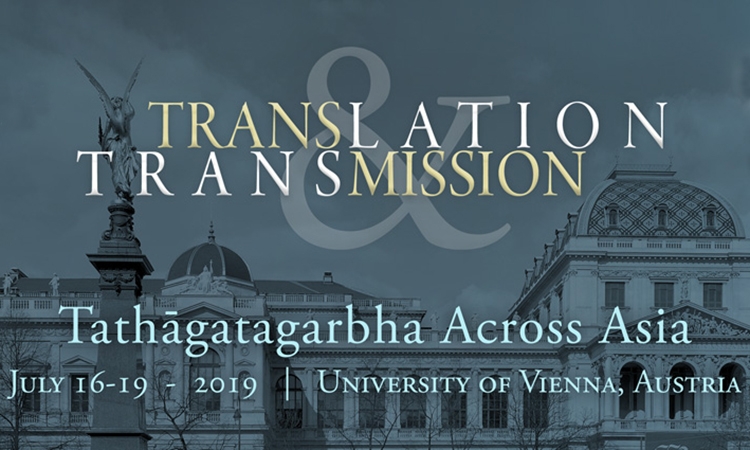
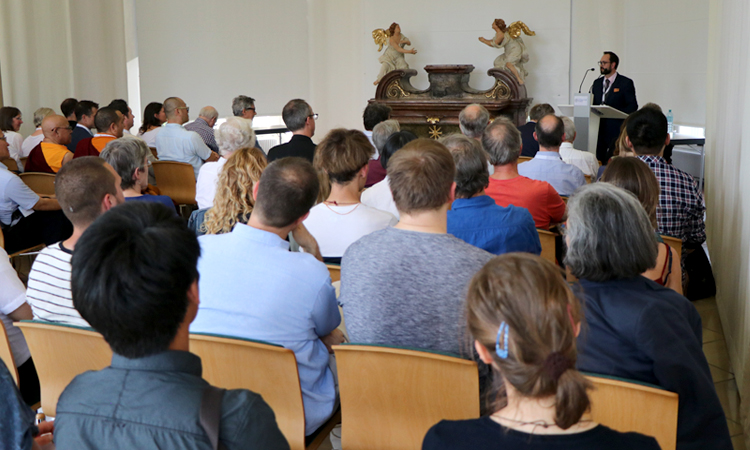

2019 Vienna Symposium
Tuesday, July 16
WELCOME DAY
5:00 PM Evening Welcome Event
Official Welcome from the organizer, Klaus-Dieter Mathes, head of the Department of South Asian, Tibetan and Buddhist Studies
Keynote Speech with Donald Lopez Jr.
Wednesday, July 17
DAY ONE
9:00 AM Session 1a with Klaus-Dieter Mathes Session 1b with Filippo Brambilla
11:00 AM Session 2a with Martina Draszczyk Session 2b with Khenpo Tamphel
2:30 PM Session 3a with Christian Charrier & Patrick Carré Session 3b with Douglas Duckworth
4:30 PM Session 4 with David Higgins
Thursday, July 18
DAY TWO
9:00 AM Session 1a with Shenpen Hookham Session 1b with Hong Luo
11:00 AM Session 2a with Sina Joos Session 2b with Khenpo Ngawang Jorden
2:30 PM Session 3a with Christopher V. Jones Session 3b with Kazuo Kano
4:30 PM Session 4a with Casey Kemp Session 4b with Seiji Kumagai
Friday, July 19
DAY THREE
9:00 AM Session 1a with Katrin Querl Session 1b with Kurtis Schaeffer
11:00 AM Session 2a with Michael Sheehy Session 2b with Jacqueline Stone
2:30 PM Session 3a with Dorji Wangchuk Session 3b with Michael Zimmermann
Speakers and Facilitators
Search speakers details
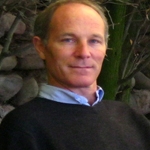
David Higgins
University of Vienna
David Higgins received his doctorate from the University of Lausanne, Switzerland in 2012. He subsequently held a position as a Post-doc Research Fellow in the Department of South Asian, Tibetan and Buddhist Studies at the University of Vienna where he explored the relationship between Mahāmudrā and Madhyamaka philosophies in Bka’ brgyud scholasticism during the post-classical period (15th to 16th centuries). His research interests include Indo-Tibetan Buddhist philosophy and epistemology with a particular focus on Bka’ brgyud Mahāmudrā and Rnying ma Rdzogs chen doctrines and practices. His PhD thesis was published under the title Philosophical Foundations of Classical Rdzogs chen in Tibet: Investigating the Distinction Between Dualistic Mind (sems) and Primordial knowing (ye shes) (Vienna, WSTB no. 78, 2013). His recent publications include Mahāmudrā and the Middle Way: Post-classical Kagyü Discourses on Mind, Emptiness and Buddha Nature (Vienna, WSTB no. 90, 2016, 2 vols.) and Buddha Nature Reconsidered: The Eighth Karma pa’s Middle Path (Vienna, WSTB, forthcoming, 2 vols.), both of which were co-authored with Martina Drazczyk.

Christopher V. Jones
St. Peter’s College, Oxford
Christopher V. Jones is a Postdoctoral Fellow of the British Academy at the University of Oxford, where he teaches topics in Indian and East Asian religion. His doctoral research, completed in 2015, concerned the breadth of Indian tathāgatagarbha literature as it survives in Sanskrit, Chinese and Tibetan sources, and its relationship to Indian discourse about the self (ātman). His first book, The Buddhist Self: On Tathāgatagarbha and Ātman, is due for publication late in 2019 with University of Hawai’i Press.
Douglas Duckworth
Temple University
Douglas Duckworth is Assistant Professor in the Department of Religion at Temple University. He is the author of Mipam on Buddha-Nature: The Ground of the Nyingma Tradition (SUNY, 2008) and Jamgön Mipam: His Life and Teachings (Shambhala, 2011). He also introduced and translated Distinguishing the Views and Philosophies: Illuminating Emptiness in a Twentieth-Century Tibetan Buddhist Classic by Bötrül (SUNY, 2011).
Kurtis Schaeffer
University of Virginia
Kurtis R. Schaeffer received an MA in Buddhist Studies from the University of Washington in 1995, a PhD in Tibetan and South Asian Religions from Harvard in 2000 and is now an associate professor of Tibetan and Buddhist Studies at the University of Virginia. His books include Sources of Tibetan Tradition (2013), The Tibetan History Reader (2013), The Culture of the Book in Tibet (2009), An Early Tibetan Catalogue of Buddhist Literature (2009), Dreaming the Great Brahmin (2005), and Himalayan Hermitess (2004).

Patrick Carré
Tsadra, Padmakara Translation Group
Masters and Ph.D. in Chinese (honorable mention) Paris VII; completed a three-year retreat with Pema Wangyal Rinpoché, 1981–1983; poet and author; former director of “Trésors du bouddhisme” collection at Éditions Fayard; member of Padmakara Translation Group. Tsadra Foundation fellow since 2002.

Filippo Brambilla
University of Vienna
Filippo Brambilla is a PhD candidate at the Department of South Asian, Tibetan and Buddhist Studies of the University of Vienna. He is currently writing his dissertation on Tshogs gnyis rgya mtsho (1880–1940), a late Jo nang scholar whose philosophical works are characterized by a distinctive approach that reconciles typically rang stong positions with more orthodox Jo nang views. Filippo’s PhD thesis will include a complete edition and translation of Tshogs gnyis rgya mtsho’s Illuminating Light (Rab gsal snang). Recently, Filippo also started working as a researcher in the FWF funded project “Emptiness of Other (gZhan stong) in the Early Jo nang Tradition.” He holds a BA and an MA in Languages and Cultures of Eastern Asia, with specialization in Chinese language and culture, from Ca’ Foscari University of Venice. Filippo has also spent long periods of study and research in China and Eastern Tibet.
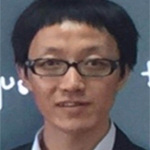
Hong Luo
Sichuan University
Hong Luo studied Indology and Buddhology at Peking University with Prof. Bangwei Wang. He was awarded Ph.D. in 2007 with a dissertation on the Pravrajyāvastu of Guṇaprabha’s Vinayasūtra. From 2007 to 2017, he was affiliated with the China Tibetology Research Center and mainly worked for the international cooperative projects on editing Sanskrit manuscripts preserved in Tibet. In 2015 and 2016, he taught as Numata visiting professor in the Department of South Asian, Tibetan and Buddhist Studies at the University of Vienna. From 2011 to 2014, he was visiting scholar of Austrian Academy of Sciences, the University of Hamburg, and Ryukoku University. In 2018, he became professor for religious studies at the Center for Tibetan Studies of Sichuan University.
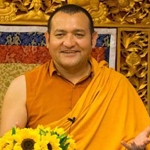
Khenpo Tamphel
University of Vienna
Khenpo Tamphel is a highly knowledgeable Buddhist scholar and translator. He is the main translator for the Ratnaśri Translation Group, headed by His Holiness Drikung Kyabgon Chetsang Rinpoche, which regularly translates for 84000. He is also the Research Officer for the Songtsen Library, an important institution and resource for Buddhist Studies.

Khenpo Ngawang Jorden
International Buddhist Academy
Khenpo Ngawang Jorden went to Sakya College, Dehradun, India, where he studied the five branches of Buddhist philosophy under the late Khenchen Appey Rinpoche. He obtained the degree of Kachupa (equivalent to B.A.) and Loppon (equivalent to M.A.) in Buddhist Studies. Khenpo Jorden later taught at Sakya College before going to America to study at Harvard University where he completed his M.A. and then Ph.D. in Buddhist Studies. His Holiness the Sakya Trizin and Khenchen Appey Rinpoche invited Khenpo Jorden to take up the position of Principal of IBA in Kathmandu and so he left his teaching post at the University of Chicago and joined IBA in 2009. As Principal of IBA he oversees the many projects IBA is involved in, teaches the Dharma to students from across the globe and engages in translation work. He also travels extensively to countries such as Taiwan, Singapore, Malaysia and Europe to give teachings.
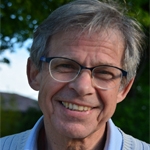
Christian Charrier
Tsadra Foundation
Masters Degree in English and diploma in psycholinguistics; translator for Geshe Tengye, France; completed three-year retreat under Lama Gendun Rinpoche, le Bost, France; translation consultant for Tsadra Foundation, 2002–2003. Tsadra Foundation fellow since 2004.
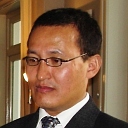
Dorji Wangchuk
Khyentse Center for Tibetan Buddhist Textual Scholarship; University of Hamburg
After completing a nine-year course in the study of Tibetan Buddhism from a traditional Tibetan Buddhist monastic seminary in South India (i.e. sNga ’gyur mtho slob mdo sngags rig pa’i ’byung gnas gling, Bylakuppe, Mysore), Dorji Wangchuk studied Classical Indology (first major, with a focus on Buddhist Studies) and Tibetology (second major) at the University of Hamburg (MA, 2002). He wrote his doctoral dissertation on “The Resolve to Become a Buddha: A Study of the Bodhicitta Concept in Indo-Tibetan Buddhism” and received his PhD from the same University in 2005. Between 1992 and 1996, he taught Tibetan Buddhist monks and nuns in monastic seminaries in India. Since 1998, he has been teaching and researching at the University of Hamburg in various capacities. He also taught a term each at the University of Copenhagen and McGill University. Currently he is a professor for Tibetology at the Department of Indian and Tibetan Studies, Asia-Africa Institute, Faculty of Humanities, University of Hamburg.

Klaus-Dieter Mathes
University of Vienna
Prof. Dr. Klaus-Dieter Mathes is the Head of the Department of South Asian, Tibetan and Buddhist Studies at the University of Vienna. His current research deals with Tibetan Madhyamaka, Yogācāra and the interpretations of Buddha nature from the 14th to the 16th century. He obtained a Ph.D. from Marburg University with a study of the Yogācāra text Dharmadharmatāvibhāga (published in 1996 in the series Indica et Tibetica). His habilitation thesis was published by Wisdom Publications under the title A Direct Path to the Buddha Within: Gö Lotsawa´s Mahāmudrā Interpretation of the Ratnagotravibhāga (Boston: 2008). Recent publications include The Other Emptiness: Rethinking the Zhentong Buddhist Discourse in Tibet (SUNY, 2019) and A Fine Blend of Mahāmudrā and Madhyamaka. Maitrīpa’s Collection of Texts on Non-conceptual Realization (Amanasikāra) (Vienna, 2015). He is also a regular contributor to the Journal of the International Association of Buddhist Studies.
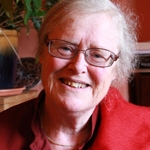
Shenpen Hookham
Awakened Heart Sangha
Lama Shenpen Hookham is the founding lama of the Awakened Heart Sangha and principle teacher of the Living the Awakened Heart training. Lama Shenpen has trained for over 50 years in the Mahāmudrā & Dzogchen traditions of Tibetan Buddhism. She has spent over 12 years in retreat and has been a student of Khenpo Tsultrim Gyamtso Rinpoche, one of the foremost living masters of the Kagyu tradition of Tibetan Buddhism, since the late 70s. Lama Shenpen has translated a number of Tibetan texts into English for her students. On Khenpo Rinpoche’s instructions she produced a seminal study of the profound Buddha Nature doctrines of Mahayana Buddhism, published as The Buddha Within (SUNY 1991) and gained a doctorate in this from Oxford University. She is also the author of There’s More to Dying than Death (Windhorse 2006) plus several articles including The practical implications of the Doctrine of Buddha Nature (SOAS The Buddhist Forum Volume II, 1991) plus Spiritual Authority – a Buddhist perspective (Buddhist Christian Studies volume 30, 2010).
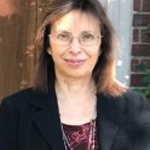
Jacqueline Stone
Princeton University
Jacqueline Stone joined the Princeton faculty in 1990. She teaches graduate and undergraduate courses in Buddhism and Japanese religions. Her chief research field is Japanese Buddhism of the medieval and modern periods. Her current research areas include death and dying in Buddhist cultures, Buddhism and nationalism, and traditions of the Lotus Sutra, particularly Tendai and Nichiren. She is the author of Original Enlightenment and the Transformation of Medieval Japanese Buddhism, which received a 2001 American Academy of Religion Award for Excellence in the Study of Religion. She has co-edited The Buddhist Dead: Practices, Discourses, Representations (with Bryan J. Cuevas, 2007), Readings of the Lotus Sutra (with Stephen F. Teiser, 2009), and other volumes of collected essays. Her newest book, Right Thoughts at the Last Moment: Buddhism and Deathbed Practices in Early Medieval Japan (working title), is forthcoming from University of Hawai’i Press. She has been president of the Society for the Study of Japanese Religions and co-chair of the Buddhism section of the American Academy of Religion. Currently she is vice president of the editorial board of the Kuroda Institute for the Study of Buddhism and serves on the advisory board of the Japanese Journal of Religious Studies.
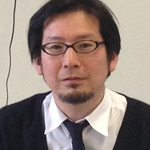
Kazuo Kano
Komazawa University, Japan
Dr. Kano is an associate professor at Komazawa University in Japan and a specialist of Sanskrit and Tibetan tathāgatagarbha literature. His particular research interests focus on philosophical interpretations of the Ratnagotravibhāga.
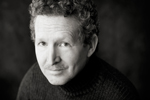
Donald Lopez, Jr.
University of Michigan
Donald Lopez is the Arthur E. Link Distinguished University Professor of Buddhist and Tibetan Studies at the University of Michigan, where he is chair of the Department of Asian Languages and Cultures. He was elected to the American Academy of Arts and Sciences in 2000. His most recent translations, both with Thupten Jinpa, are Grains of Gold: Tales of a Cosmopolitan Traveler (the Gtam rgyud gser gyi thang ma of A mdo Dge ’dun chos ’phel) and Ippolito Desideri’s refutation of rebirth and emptiness, Dispelling the Darkness: A Jesuit’s Quest for the Soul of Tibet. Forthcoming translations include the grub mtha’ of Lcang skya rol pa’i rdo rje.
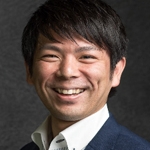
Seiji Kumagai
Kyoto University
Seiji Kumagai was born in 1980 in Hiroshima (Japan). He studied Buddhist philosophy and received his Ph.D. in 2009 from Kyoto University. In 2011, he became an assistant professor at the Hakubi Center for Advanced Research of Kyoto University. Since 2013, he has been Uehiro Associate Professor at Kokoro Research Center of Kyoto University from then until the present. Since 2017, he has been a divisional director of the Department of Bhutanese Studies at Kokoro Research Center. He was invited by University of Vienna as Numata Professor in 2018.
His field of research is Buddhist Madhyamaka philosophy in India, Tibet, and Bhutan, and also that of Bon religion. He has also conducted research on the history of Tibetan and Bhutanese Buddhism. His most notable publications include books such as The Two Truths in Bon (Kathmandu: Vajra Publications, 2011), Bhutanese Buddhism and Its Culture (Kathmandu: Vajra Publications, 2014), and Buddhism, Culture and Society in Bhutan (Kathmandu: Vajra Publications, 2018), as well as numerous academic articles on Indo-Himalayan Buddhism and Bon.

Katrin Querl
Drikung Kagyu
Katrin Querl holds a Master’s degree in Tibetology, Indology, and Religious Studies from the Ludwig-Maximilians-University in Munich, Germany. From 2011 to 2017 she studied Buddhist philosophy at the Kagyu College in Dehradun, India where she completed the first six years of the traditional monastic curriculum. Katrin is currently a PhD candidate at the Institute for South Asian, Tibetan and Buddhist Studies (ISTB) at the University of Vienna, writing her thesis on Tibetan presentations of the Three Wheels of Dharma (chos ‘khor rim pa gsum). She also collaborates with several translation projects such as the Vikramashila Translation Project, the Rinchenpal Translation Project, and the Buddhist Translation Studies project (BTS) at the University of Vienna.
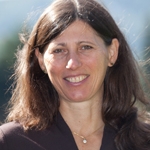
Martina Draszczyk
University of Vienna
Martina Draszczyk holds a PhD in Buddhist Studies and Tibetology. Her doctoral thesis at the Department for South Asian, Tibetan and Buddhist Studies of the University of Vienna dealt with the integration of the notion of buddha-nature in meditation practice. She trained in Buddhist philosophy and meditation with both Tibetan Buddhist and Theravāda teachers and acted as an interpreter for Tibetan masters for many years. In her research projects she focuses on Tibetan Madhyamaka, Mahāmudrā, and buddha-nature theories mainly in the context of the Bka’ brgyud tradition. She also teaches in Buddhist centers in Europe as well as in the field of secular mindfulness.
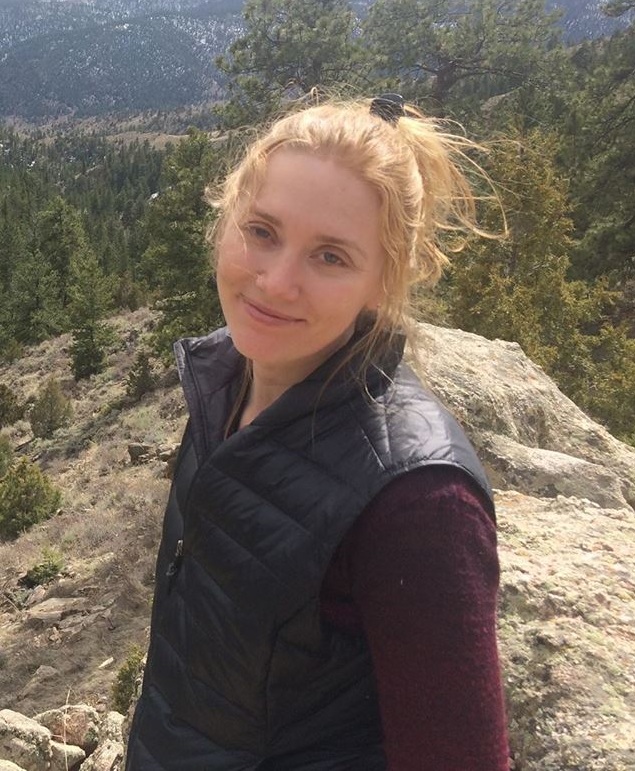
Casey Kemp
Shambhala Publications
Casey Kemp is a translator and editor of Buddhist texts. She received her Master’s degree from Oxford University in Tibetan Buddhist philosophy, and has worked closely with the Drikung Kagyu monastic community in Europe and Asia. She is completing her PhD dissertation on the concept of luminosity in the early Tibetan Mahāmudrā tradition through the University of Vienna and has translated and edited for 84000. She currently resides in Boulder working as a Snow Lion editor at Shambhala Publications.
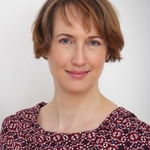
Sina Joos
University of Vienna
Sina Joos received her M.A. in Tibetan studies, Chinese studies and History of Oriental Art in 2009 from the University of Bonn, Germany. Since 2016 she is a PhD candidate at the Department of South Asian, Tibetan and Buddhist Studies at the University of Vienna, Austria, under the supervision of Prof. Klaus-Dieter Mathes. Her research focuses on the gzhan stong doctrine of the jo nang school, while her teachers are mainly from the bka’ brgyud school of Tibetan Buddhism. Apart from her academic studies, she participated in the Translation Training Program at Rangjung Yeshe Institute in Kathmandu and works at the Kamalashila Instituteâ for Buddhist Studies and Meditation, interpreting for Tibetan Lamas as well as translating and editing texts for the practice sessions and seminars.

Michael Zimmermann
University of Hamburg
Michael Zimmermann studied Classical Indology, Tibetology and Japanese Studies at the University of Hamburg and earned his doctorate with a thesis on the origin of the teaching of buddha-nature in India. He spent several years studying at universities in Kyoto and Tokyo; later he worked for the Nepalese-German Manuscript Preservation Project of the German Research Foundation in Hamburg and Kathmandu, where from 2002 to 2003 he also headed the Nepal Research Center. After four years as assistant professor in the Department of Religious Studies at the University of Stanford (USA) and as director of the Stanford Center for Buddhist Studies, in 2007 he became professor for Indian Buddhism at the Asien-Afrika-Institut of the University of Hamburg. His research focus is Indian Mahayana Buddhism in all its forms of expression, but in particular its textual history based on the canonical traditions in India, Tibet and China. He also deals with questions of Buddhist ethics such as the relationship of Buddhism to governance and violence. Another of his interests are the developments regarding contemporary Buddhism in East and West. Zimmermann co-directs the Numata Center for Buddhist Studies at Hamburg University, an institutional forum promoting teaching, research, dialogue, academic exchange and public outreach in Buddhist Studies.
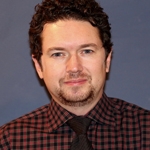
Michael Sheehy
University of Virginia
Michael R. Sheehy, Ph.D., is the Director of Scholarship at the Contemplative Sciences Center and Research Assistant Professor in the Department of Religious Studies at the University of Virginia. His work gives attention to the cultural history of marginalized traditions of Tibetan Buddhism, the thought and literature of contemplative traditions in Tibet, and contributions of Buddhism to discourses in the cognitive sciences and cultural psychology. He is co-editor with Klaus-Dieter Mathes of The Other Emptiness: Rethinking the Zhentong Buddhist Discourse in Tibet (SUNY 2019).

